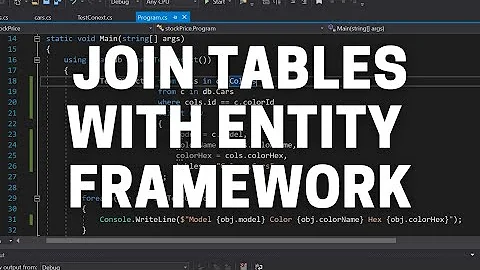Can I join a table to a list using linq?
Solution 1
You probably found out that you can't join an Entity Framework LINQ query with a local list of entity objects, because it can't be translated into SQL. I would preselect the database data on the account numbers only and then join in memory.
var accountNumbers = lstFarmerProfiles.Select(x => x.AccountNo).ToArray();
var duplicationChecklist =
from profile in dataAccessdup.MST_FarmerProfile
.Where(p => accountNumbers
.Contains(p.AccountNo))
.AsEnumerable() // Continue in memory
join param in lstFarmerProfiles on
new { profile.Name, profile.AccountNo} equals
new { param.Name, param.AccountNo}
select profile
So you will never pull the bulk data into memory but the smallest selection you can probably get to proceed with.
If accountNumbers contains thousands of items, you may consider using a better scalable chunky Contains method.
Solution 2
Since you have the lists in .net of values you want to find, try to use the Contains method, for sample:
List<string> names = /* list of names */;
List<string> accounts = /* list of account */;
var result = db.PersonalDetails.Where(x => names.Contains(x.Name) && accounts.Contains(x.AccountNo))
.ToList();
Solution 3
Since data is usually located on different machines or in separate processes at least: DB - is one and your in-memory list is your app, there is just 2 ways to do it.
- Download as small data part from DB to local as possible and join locally (usually using
AsEnumerable()or basicallyToList()). You got many good thoughts on this in other answers. - Another one is different - upload your local data to server somehow and perform query on DB side. Uploading can be done differently: using some temp tables OR using VALUES. Fortunately there is a small extension for EF now (for both EF6 and EF Core) which you could try. It is EntityFrameworkCore.MemoryJoin (name might be confusing, but it supports both EF6 and EF Core). As stated in author's article it modifies SQL query passed to server and injects VALUES construction with data from your local list. And query is executed on DB server.
Solution 4
If MST_FarmerProfile is not super large I think you best option is to bring it into memory using AsEnumerable() and do the joining there.
var duplicationhecklist =
(from x in dataAccessdup.MST_FarmerProfile
.Select(z => new {
z.Name,
z.BankName,
z.BranchName,
z.AccountNo
}).AsEnumerable()
join y in lstFarmerProfiles
on new { x.Name, x.AccountNo} equals new { y.Name, y.AccountNo}
select x).ToList();
Related videos on Youtube
Saket Kumar
Software Engineer exploring these tech stacks C#.Net, .Net Core, Web API, ASP.Net MVC, ReactJS, Node JS, .Net Core, WCF, jQuery, Bootstrap, AWS Cloud and MSSql Server.
Updated on March 23, 2020Comments
-
 Saket Kumar about 4 years
Saket Kumar about 4 yearsI have a table as follows:
PersonalDetails Columns are: Name BankName BranchName AccountNo AddressI have another list that contains 'Name' and 'AccountNo'. I have to find all the records from table that whose respective 'Name' and 'AccountNo' are present in given list.
Any suggestion will be helpful.
I have done following but not of much use:
var duplicationhecklist = dataAccessdup.MST_FarmerProfile .Join(lstFarmerProfiles, t => new { t.Name,t.AccountNo}, t1 => new { t1.Name, t1.AccountNo}, (t, t1) => new { t, t1 }) .Select(x => new { x.t1.Name, x.t1.BankName, x.t1.BranchName, x.t1.AccountNo }).ToList();where
lstFarmerProfilesis a list.-
 gleng over 10 yearsHow about you show us what you've attempted first?
gleng over 10 yearsHow about you show us what you've attempted first? -
 Saket Kumar over 10 years@gleng: Now can u help?
Saket Kumar over 10 years@gleng: Now can u help? -
 Bvrce over 10 yearsDoes AccountNo uniquely identity the record?
Bvrce over 10 yearsDoes AccountNo uniquely identity the record? -
John Gibb over 10 yearsI'd look into using table valued parameters and writing a custom SQL query for this... I can give more info if you're interested, but it doesn't really use linq, so not really an answer to your specific question.
-
-
 Saket Kumar over 10 yearsThere is a single list that has names and accounts.
Saket Kumar over 10 yearsThere is a single list that has names and accounts. -
 Saket Kumar over 10 yearsMST_FarmerProfile contains 2 million record. Will you still suggest the same?
Saket Kumar over 10 yearsMST_FarmerProfile contains 2 million record. Will you still suggest the same? -
Magnus over 10 years@sake Perhaps you don't need to bring all the columns from the table into memory, do a select before the
.AsEnumerable()to get the columns you need. The only way to know if the execution time is acceptable is to test it. -
Magnus over 10 years@Saket How large is
lstFarmerProfilesgoing to be? -
 Saket Kumar over 10 yearslstFarmerProfiles will contain 1000 records.
Saket Kumar over 10 yearslstFarmerProfiles will contain 1000 records. -
Magnus over 10 years@Saket Let me know how it goes.
-
 Saket Kumar over 10 yearsIt wont match each record of database exactly to each row of list.
Saket Kumar over 10 yearsIt wont match each record of database exactly to each row of list. -
 Saket Kumar over 10 yearsI get exception: "Object reference not set to an instance of an object."
Saket Kumar over 10 yearsI get exception: "Object reference not set to an instance of an object." -
Gert Arnold over 9 yearsI gave some more details here.
-
 jtate almost 6 yearsjust a theoretical question, but why can't a local list be translated into SQL? When the query actually runs, LINQ should be able to create a temp table or table variable with the data from the local list and then join on that. This is a feature that should absolutely be included in the framework.
jtate almost 6 yearsjust a theoretical question, but why can't a local list be translated into SQL? When the query actually runs, LINQ should be able to create a temp table or table variable with the data from the local list and then join on that. This is a feature that should absolutely be included in the framework. -
Gert Arnold almost 6 years@jtate There are some private efforts in that direction. To me these only show that it's not really trivial.
-
 jtate almost 6 years@GertArnold this is exactly what I was imagining. With fairly small in-memory collections, I think this would work great.
jtate almost 6 years@GertArnold this is exactly what I was imagining. With fairly small in-memory collections, I think this would work great. -
TChadwick over 3 yearsWe just added this library and it is AWESOME!!!! This solves most situations where linq to entities stops you. (We were struggling with providing IDs and keeping the sort order)






